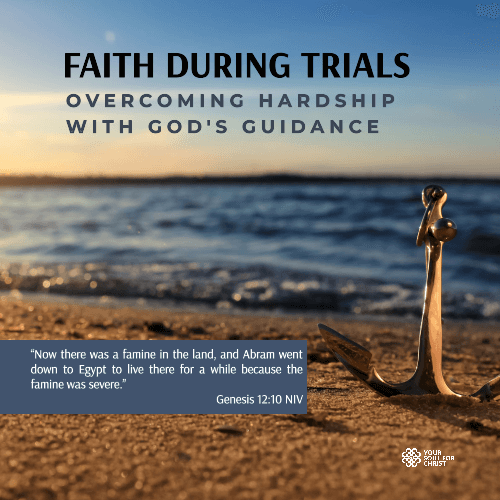Now there was a famine in the land, and Abram went down to Egypt to live there for a while because the famine was severe. As he was about to enter Egypt, he said to his wife Sarai, ‘I know what a beautiful woman you are. When the Egyptians see you, they will say, “This is his wife.” Then they will kill me but will let you live. Say you are my sister, so that I will be treated well for your sake and my life will be spared because of you.’
Genesis 12:10-13 NIV
Genesis 12:10 introduces us to Abram facing a critical moment of hardship—a famine in the land of Canaan, where God had led him. Instead of seeking God’s guidance, Abram made a decision rooted in self-preservation and went down to Egypt. This choice serves as a significant lesson about faith during trials. Abram’s actions reveal a common human struggle: trusting God when circumstances seem overwhelming. Despite God’s promise to sustain him in the land of Canaan, Abram relied on his own understanding. This passage invites us to reflect on how we respond to challenges. Do we trust in God’s provision, or do we let fear dictate our actions?
Abram’s journey to Egypt highlights a critical moment where his faith was tested during the trial of famine. The famine in Canaan may have been a divine opportunity for Abram to depend on God completely. Instead, he chose to rely on his own plans. His decision to leave Canaan for Egypt illustrates a common human tendency. When faced with challenges, we often take matters into our own hands rather than waiting on God.
Abram could have sought God’s direction to survive the famine while remaining in the land of promise. Instead, he prioritised immediate relief, even if it meant stepping out of God’s will. This shift in focus reminds us to stay rooted in faith during trials, no matter how daunting the situation may seem.
This prompts self-reflection. How often do we, like Abram, shift our focus away from God during tough times? Do we remember His promises, or do we create our own solutions, assuming He cannot sustain us? Abram’s story reminds us that even those with great faith can falter under pressure.
As Abram and Sarai approached Egypt, Abram devised a plan rooted in fear and self-preservation. Aware of Sarai’s beauty, he anticipated that the Egyptians might kill him to take her. To protect himself, Abram asked Sarai to claim she was his sister rather than his wife. This request marked a significant compromise. Sarai had always been known as Abram’s wife, yet Abram chose deception to secure his safety. This decision placed Sarai at risk, exposing her to potential harm while prioritising his own survival.
Abram’s actions reflect self-centeredness. He sought favour from the Egyptians, hoping Sarai’s beauty would benefit him materially. By prioritising his survival and comfort, Abram neglected his relationship with God and failed to trust in God’s protection.
Meanwhile, Abram’s actions challenge us to examine our responses to hardship. Are we quick to compromise our values or seek alliances with the world to escape trials? Do we, like Abram, place our trust in human schemes rather than God’s provision?
This story also highlights an important truth: God will not lead us to a place where He cannot sustain us. The famine in Canaan may have been a test of Abram’s faith—a chance to depend on God amidst adversity. Instead, Abram chose a path of compromise, illustrating that even the faithful are prone to missteps.
Abram’s story serves as both a cautionary tale and a reminder of God’s faithfulness. No hardship should drive us to compromise our relationship with God. Instead, we must trust that He sees our struggles and has the power to provide for us. God is never unaware of our circumstances, and He does not abandon His people in times of need.
When we are tempted to seek refuge or comfort outside God’s will, let us remember this: our strength, provision, and protection come from Him alone. Aligning ourselves with God’s plans, even in the face of adversity, ensures that we remain under His covering and guidance.
In conclusion, Abram’s journey offers a profound lesson on faith during trials. While his faith faltered under pressure, his story encourages us to examine our responses to adversity. Are we quick to rely on our own plans, or do we remain steadfast in trusting God?
Let us remember that God is fully aware of our challenges and is always capable of sustaining us. Faith during trials is not about avoiding hardships but about trusting God to lead us through them. By keeping our focus on His promises, we can endure any challenge with confidence in His unwavering faithfulness.
So, when faced with life’s trials, will you rely on your own strength or place your trust in God’s hands? Choose faith—it never fails.




